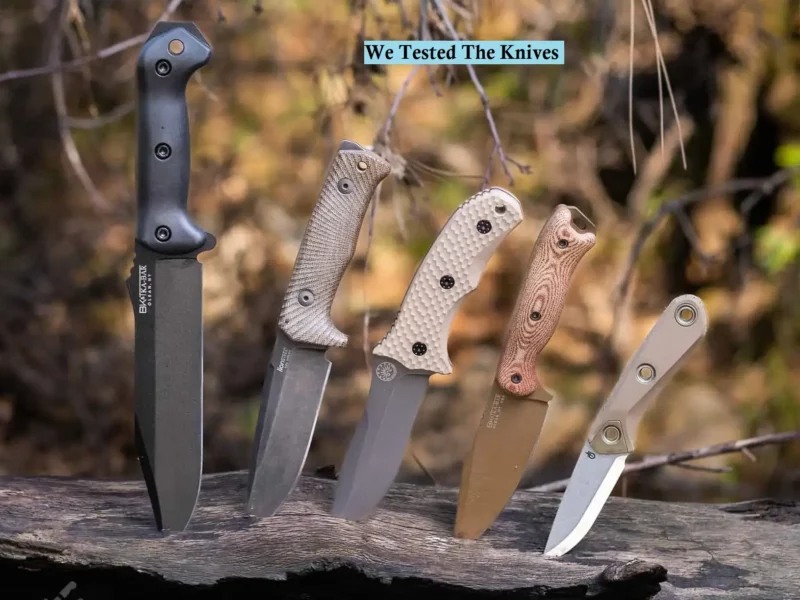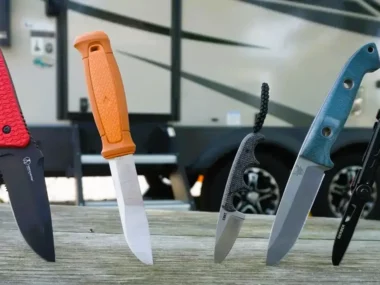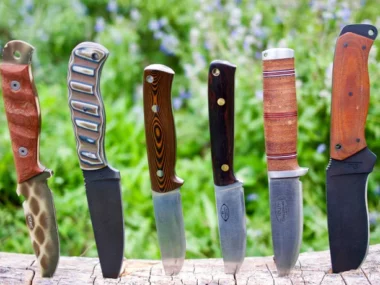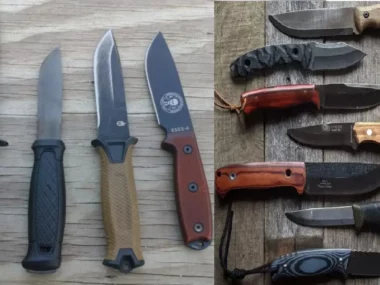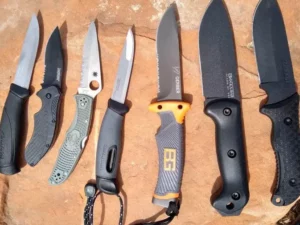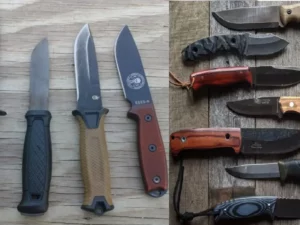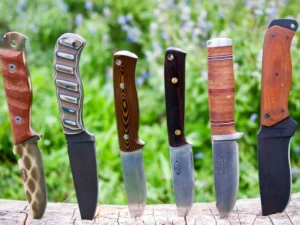Introduction
Having proficient knife skills is paramount for camping and outdoor. From ensuring safety to enhancing resourcefulness, mastering the art of using a knife plays a vital role in various aspects of wilderness adventures.
With proper knife skills, campers can efficiently prepare meals, perform essential tasks, and navigate unexpected situations.
In this blog post, we will explore the importance of knife skills and delve into essential techniques that every outdoor enthusiast should know.
Table of Contents
Importance of Knife Skills for Camping and Outdoor Activities
Having knife skills is crucial for camping and outdoor enthusiasts due to the following reasons:
- Safety: Proper knife skills ensure a safe camping experience. Understanding how to handle and use a knife correctly minimizes the risk of accidents and injuries.
- Food Preparation: Knife skills are essential for preparing meals while camping. Knowing how to efficiently and safely cut, slice, and chop ingredients saves time and enhances the overall cooking experience in the wilderness.
- Versatility: Knife skills allow for a wide range of tasks, from cutting ropes and setting up tents to carving wood for campfire crafts. Mastering these skills enables campers to tackle various outdoor tasks with ease and efficiency.
- Resourcefulness: Proficient knife skills promote resourcefulness in the outdoors. With the ability to fillet fish, debone meat, and carve wood, outdoor enthusiasts can make the most of their surroundings and utilize natural resources effectively.
- Self-Reliance: Developing knife skills fosters self-reliance in the wilderness. By being able to perform tasks independently, such as starting a fire, building shelters, or preparing food, campers become more self-sufficient and confident in their outdoor abilities.
- Safety and Emergency Situations: Knife skills are invaluable in emergency situations. Whether it’s cutting ropes during a rescue operation or improvising tools for survival, having the expertise to handle a knife can be vital to resolving challenging circumstances.
- Enjoyment and Connection with Nature: Knife skills enhance the overall outdoor experience. From carving woodwork projects to skillfully preparing a meal, honing these abilities allows campers to form a deeper connection with nature and gain a sense of accomplishment.
In summary, knife skills are of utmost importance for camping and outdoor activities.
They ensure safety, enable efficient food preparation, enhance versatility, promote resourcefulness and self-reliance. They offer valuable assistance in emergencies, and contribute to a more enjoyable and fulfilling outdoor experience.
Knife Safety:
To ensure knife safety while camping and engaging in outdoor activities, it is crucial to follow these guidelines:
- Use proper handling and grip techniques:
- Hold the knife firmly with a secure, non-slip grip.
- Keep your fingers away from the blade’s path to avoid accidental cuts.
- Adopt safe cutting positions and prevent accidents:
- Ensure your stance remains stable and balanced while performing cuts.
- Use a cutting board or stable surface to prevent the knife from slipping.
- Follow essential safety precautions:
- Always cut away from yourself and others.
- Keep the knife’s edge pointed downwards when not in use.
- Store knives in a sheath or secure case when transporting or storing.
By practicing proper handling, adopting safe cutting positions, and following necessary safety precautions, you can significantly reduce the risk of accidents and ensure a safe camping experience.
Knife Selection for Camping:
Selecting the right knife for camping activities is essential to ensure you have a versatile and reliable tool at hand. When choosing a knife for camping, consider the following factors:
- Purpose and Activities:
- Evaluate the tasks you plan to perform during camping, such as food preparation, woodwork, or general utility needs.
- Choose a knife that aligns with the specific activities you intend to engage in to ensure optimum performance.
- Types of Knives and Their Uses:
- Fixed Blade Knives: These knives have a solid, non-folding blade that offers durability and strength for heavy-duty tasks like chopping firewood, bushcraft, or hunting.
- Folding Knives: Compact and portable, folding knives are versatile tools that are great for everyday tasks like slicing food, cutting rope, or light woodwork.
- Blade Considerations:
- Blade Material: Stainless steel blades are known for their corrosion resistance, whereas carbon steel blades offer excellent sharpness and edge retention.
- Blade Length: Consider the blade length based on your intended tasks. Longer blades are better suited for chopping and slicing, while shorter blades offer more control for intricate work.
- Handle Considerations:
- Ergonomics: Look for a handle that fits comfortably in your hand and provides a secure grip, ensuring precision and reducing hand fatigue during extended use.
- Handle Material: Common handle materials include wood, rubber, or synthetic materials, each offering its own advantages in terms of grip, durability, and weather resistance.
- Additional Features:
- Tang: Full-tang knives, where the blade extends through the handle, add strength and stability.
- Locking Mechanism (for folding knives): Check for a reliable locking mechanism to ensure the blade stays securely in place during use.
By carefully considering the purpose of your knife, understanding the different types available, evaluating blade characteristics, handle ergonomics, and exploring additional features, you can make a more informed decision when selecting a knife for your camping adventures.
Essential Knife Skills for Camping:
- Knife sharpening maintenance:
Maintain your knife by regularly cleaning, drying, and lubricating it. Learn to sharpen the blade using a sharpening stone or suitable tools to keep it in optimal condition. - Basic cutting techniques for food preparation:
Master the claw grip to safely hold ingredients while using the knife. Practice techniques like slicing, chopping, and julienning for efficient food preparation while camping. - Slicing, dicing, and chopping methods:
Familiarize yourself with different slicing techniques such as cross-cutting or bias cutting. Learn proper dicing and chopping techniques to achieve consistent and efficient results with your knife. - Knife skills for woodwork and outdoor tasks:
Develop skills for wood carving and whittling, including shaping and smoothing wood for utensils, tools, or campsite essentials. Understand how to use your knife for tasks like making kindling or preparing tinder. - Knife safety while performing various camping tasks:
Ensure safety by keeping the knife pointing away from yourself and others. Maintain a stable position and use controlled motions while cutting or carving. Have a secure grip and cutting surface for tasks like batoning or using a knife as a tool.
To have a better camping experience in the wilderness, you should prioritize knife safety, focus on sharpening and maintaining your knife, and learn basic cutting techniques for food preparation.
Master slicing, dicing, and chopping methods to enhance your skills. Additionally, acquire knife skills for woodwork and outdoor tasks to make camping easier and safer.
Advanced Knife Skills for Camping:
- Filleting fish andoning techniques:
Master the art of filleting fish by removing the bones and skin with precision and efficiency. Learn deboning techniques to extract meat from poultry or game. - Carving and whittling techniques for woodcraft:
Develop advanced skills for carving intricate designs and patterns on wood. Learn whittling techniques to create functional objects like utensils or decorative items. - Knot tying and rope cutting skills:
Master various knot tying techniques, such as the bowline or clove hitch, for securing gear or setting up shelters. Learn proper rope cutting techniques using a knife to safely and efficiently cut ropes or cords.
By honing advanced knife skills in filleting fish and deboning, mastering carving and whittling techniques for woodcraft, and acquiring knot tying and rope cutting skills, you can elevate your camping experience and engage in more specialized tasks while ensuring safety and precision.
Practice and Tips for Improving Knife Skills:
- Regular practice to enhance proficiency:
Engage in consistent and regular practice sessions to improve knife skills, focusing on precision, control, and speed. - Knife skill improvement exercises and drills:
Participate in specific exercises and drills designed to enhance knife skills, such as chopping vegetables, slicing fruit, or practicing intricate cuts. - Tips for honing knife skills in a safe and efficient manner:
- Maintain a firm grip on the knife and position your fingers safely away from the blade during cutting.
- Utilize a stable cutting surface to prevent slips and accidents.
- Start with slower movements and gradually increase speed as you gain confidence and control.
- Always pay attention to proper form and technique during practice sessions.
By dedicating regular practice, engaging in skill improvement exercises and drills, and following safety tips for honing knife skills, you can enhance your proficiency, efficiency, and safety while working with a knife during camping or other activities.
Importance of Knife Maintenance:
- Proper cleaning and drying to prevent rust:
Clean knives thoroughly after each use, removing any debris or food particles, and ensure they are completely dry to prevent rust formation. - Importance of sharpening and honing blades regularly:
Regularly sharpen and hone knife blades to maintain their sharpness and cutting efficiency, ensuring safer and more precise cuts. - Storage and care tips for preserving knife longevity:
Store knives in a designated knife block, sheath, or magnetic strip to protect the blades and prevent accidents. Avoid exposure to moisture, extreme temperatures, or contact with other metal objects that can cause damage.
By prioritizing proper cleaning, drying, regular sharpening, and honing, as well as following appropriate storage and care practices, you will ensure the longevity, performance, and safety of your knives.
Conclusion
In this blog post, we covered vital knife skills for camping, including knife sharpening, basic cutting techniques, slicing, dicing, and chopping methods, as well as woodwork and outdoor tasks.
I encourage readers to dedicate regular practice sessions to enhance their knife skills.
With consistent practice, one can become more proficient and confident in handling a knife during camping trips.
Lastly, it is crucial to prioritize safety and responsible knife use while camping and enjoying outdoor adventures. Regular maintenance, such as cleaning, drying, sharpening, and proper storage, ensures optimal performance and longevity of your knife.
Always remember to use knives responsibly and follow safety guidelines to prevent accidents and promote a positive camping experience.
By summarizing the essential knife skills discussed, encouraging practice and improvement, and emphasizing safety, maintenance, and responsible knife use, we can equip ourselves with the knowledge and skills necessary to make camping and outdoor ventures more enjoyable and safe.
Md Ismail Hossen
- is a Professional & Trusted Outdoor Authority, provides a valuable insights & tips on Products.

